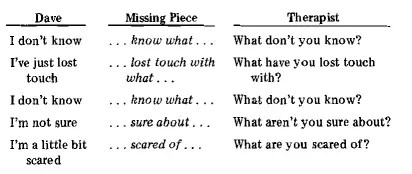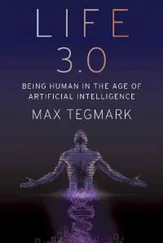Therapist: Can you tell me what some of those things are?
Dave: Well, I don't know… I guess I've just lost touch …
Therapist: Lost touch with?
Dave: I don't know. . . . I'm not sure.
Therapist: Dave, what is it, specifically, that you don't know, that you're not sure of?
Dave: … Well, I'm not sure anymore of what I want, for me or for my family. I'm a little bit scared. Therapist: … scared of?
The therapist is continuing to assist Dave in coming to understand what, specifically, it is that he wants for himself and his family. One of the most important patterns of which we are aware is the therapist's ability to sense what is missing in a family system. This capability to discern what is missing is critical in assisting the family in changing, and it applies at many different levels of behavior. For example, one thing which we, specifically, check for is the freedom of each family member to ask for what he wants. If that freedom is missing for any member of the family, then we work to find ways for him to gain that freedom. This is an example of something important which is missing at a high level of patterning. The process of identifying missing parts of experience and assisting the one with whom you are working in recovering them or completing imperfect experiences — of making things whole — is one of the most powerful interventions which we, as therapists, have available to us. The very process of making things whole, whether at a verbal or a nonverbal level, has a profound physical and neurological effect upon the person involved.
At the verbal level of patterning, Dave has produced a series of sentences, each of which has something missing. The therapist is responding systematically, first identifying that something is missing and then asking directly for it. For example, Dave says,
I've just lost touch.
As the therapist listens to this sentence, he tries to make sense out of it. He hears Dave describe his experience with the verb lost touch. In addition, he hears Dave say, specifically, that he (Dave) has lost touch. But, as the therapist attempts to understand what Dave is saying, he notices that Dave has failed to state with what specifically he has lost touch. In other words, the therapist understands that the descriptive verb lose touch is an expression of someone's losing touch with something or someone, and that what or whom it is is not stated — it is missing — or, in terms of a language description, it has been deleted. [5] A fuller presentation of the use of this verbal pattern is available on pages 40-43, 49-51, and 59-73 in The Structure of Magic, Volume I; and pages 209-231 in Patterns of the Hypnotic Techniques of Milton H. Erickson, M.D.
We can represent this as follows: When the therapist (or any native speaker of American English) hears someone using the verb lose touch, he knows that it is a description of a process which has taken place between the person or thing doing the touching and the person or thing being touched:

or
LOSE TOUCH (person/thing touching, person/thing being touched}.
The amazing thing is that, even when the sentence which the listener (in this case, the therapist) hears fails to include one or the other of these pieces, he knows by his intuitions about language that both of the pieces are implied. For example, when the therapist or any native speaker of English hears the following sentence, he understands that more is implied than is actually present in the sentence.

One of the temptations for the therapist is to fill in his own understanding of what has been deleted, thereby losing the opportunity to learn what's missing for the family member.
Since the therapist can use his own language intuitions to determine whether anything is missing, he can listen and systematically respond, asking for the portions which are implied but not expressed. Extracting from the transcript, we have,

By listening carefully and making use of the intuitions he has about his language, the therapist can systematically assist Dave in understanding what he has deleted.
Therapist: Scared of?
Dave: Well, I know that Marcie (the mother/wife) is depending on me.
Therapist: How do you know that Marcie is depending on you, Dave?
Dave: Well, I know her pretty well; I just sense it.
Therapist: Yes; I understand that you know her pretty well, and what I'm trying to understand is how you communicate with her. Can you tell me how, specifically, you sensed just now that she was depending on you?
Dave: Sure; see the way that she's looking at me — that's how I know she's depending on me.
Words carry meanings. We need to understand that these words are idiosyncratic to the person using them, and there is no guarantee that the same meaning will be understood by the other person. So checking out is always necessary.
When each of us uses our language system to describe our experience, we select certain words to carry the meaning to the listener. For example, we use nouns to describe certain parts of our experience. As we mentioned previously, when we use nouns which have no referential index relative to a specific part of the listener's experience, we fail to communicate with as much clarity as is possible. Similarly, when we (albeit, unconsciously) select verbs to describe the processes or relationships which we experience, we have choices about how specific we will be, and, consequently, how clear our communication will be. For example, if I select the verb kiss to describe a process in my experience, I convey more information than if I select the verb touch, although both are accurate descriptions of my experience.
I kissed Judith contrasted with I touched Judith
The verb kiss conveys all of the meaning which the verb touch carries, with the additional specification that I touched Judith with my lips. In other words,
kiss = touch with lips
We can say, then, that the verb kiss (relative to the verb touch) is more specified; it gives the listener more information about the process being described. The verb kiss could, of course, be further particularized by specifying where the lips touched the person being kissed. This process we call specifying verbs. [6] The process of requesting that the family member specify his process descriptions — that is, specify verbs — is one of the ways in which the therapist insures that he or she is working with the coping pattern in the family member's model of the world and not in the therapist's own model projected onto the family member. A fuller presentation is available on pages 48-49 and 90-92 in The Structure of Magic, Volume I.
As the therapist goes about the task of assisting the family members in understanding what they seek, he sets a model for clear communication. In the verbal exchange, he can check the verbs which the family members use to describe their experience, requesting that they specify these process descriptions until he can make sense out of their narrations. Again, extracting from the transcript, we have,
Читать дальше














